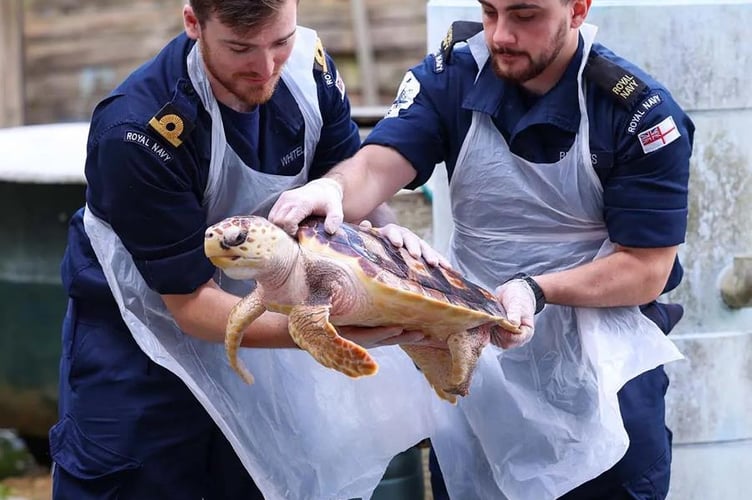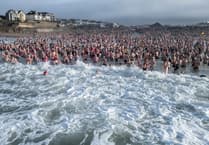FIVE stranded juvenile loggerhead sea turtles who have been receiving rehabilitation treatment at a Newquay aquarium returned home, thanks to help from the Royal Navy.
The juvenile loggerhead sea turtles have been in Blue Reef Aquarium’s care since January 2023, when the first one arrived. Volunteers from the British Divers Marine Life Rescue have since been back to the aquarium seeking help with rehabilitating the additional juvenile loggerhead turtles.
The five sea turtles made their way to Azores after an extended stay at the aquarium thanks to the help of the Royal Navy. Upon arriving at Devonport, Plymouth, the turtles were boarded and cared for on the naval ship before departing for Azores. Volunteers from the Royal Navy were trained by staff at the aquarium on how to care for the loggerheads before they made their way to their destination.
Crew of HMS Medway released the vulnerable creatures once they reached warmer waters in the western Atlantic as the patrol ship heads towards the Caribbean.

Medway sailed from Plymouth on Friday September 20th to relieve her sister ship HMS Trent, supporting international counter-drug smuggling operations across the Americas, and assisting island communities should they be ravaged by storms during the hurricane season.
Medway, alongside her regular cargo of food supplies, spare parts for machinery, disaster relief, aid kits, also carried Jason, Gordon, Perran, Hayle, Holly and Tonni, six loggerhead turtles cared for by aquariums in Newquay and Anglesey.
The creatures had sufficiently developed and the time came to ‘repatriate’ them but they had to be returned to their warm, native waters, which meant shipping them back across the Atlantic.
Blue Reef Aquarium’s general manager Steve Matchett said: “These turtles are washed up in an extremely weakened state called cold stunned and are very often dehydrated.
“They are from warm waters and get taken off course by storms when following warm Atlantic currents. We have followed an established procedure to return them to full health and get them ready for release back into warmer waters, near the Azores.”
Lara Heaney the aquarium’s assistant curator, said: “Over a period of weeks we very gradually raise the temperature of the water and when the turtles become more active we then started them feeding and swimming.
“To start with we re-hydrate them by tubing or syringing fluids into their mouths several times a day. Then progress onto a liquidised fish diet”.
It is very important that any turtles washed up are not put back into the sea, as they will die as UK waters are too cold.
What to do if you find a stranded turtle*:
· Do not attempt to put the turtle back into the sea
· Wrap in a towel soaked in seawater, don’t cover nostrils
· Place in a secure place on its belly and do not attempt to warm the animal up, keep it at the same temperature you found it
· If inactive, raise the back end of the shell so the turtle is resting at approximately 30° to drain lungs
· Contact the British Divers Marine Life Rescue 24hr hotline on 01825 765546
*These rules do not apply to leatherback turtles which can be carefully re-floated if uninjured. Please check with an expert first.





Comments
This article has no comments yet. Be the first to leave a comment.